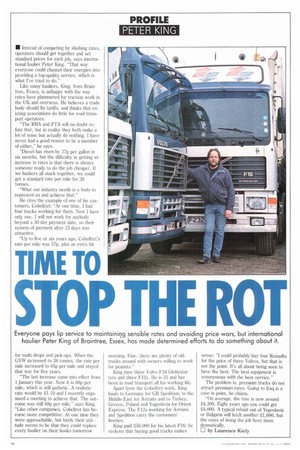TIME TO
Page 30

If you've noticed an error in this article please click here to report it so we can fix it.
STOP THE ROT
Everyone pays lip service to maintaining sensible rates and avoiding price wars, but international haulier Peter King of Braintree, Essex, has made determined efforts to do something about it.
• Instead of competing by slashing rates, operators should get together and set standard prices for each job, says international haulier Peter King. "That way everyone could channel their energies into providing a top-quality service, which is what I've tried to do."
Like many hauliers, King, from Braintree, Essex, is unhappy with the way rates have plummeted for traction work in the UK and overseas. He believes a trade body should fix tariffs, and thinks that existing associations do little for road transport operators..
"The RHA and FTA will no doubt refute that, but in reality they both make a lot of noise but actually do nothing. I have never had a good reason to be a member of either,' he says.
"Diesel has risen by 27p per gallon in six months, but the difficulty in getting an increase in rates is that there is always someone ready to do the job cheaper. If we hauliers all stuck together, we could get a standard rate per mile for 38 tonnes.
"What our industry needs is a body to represent us and achieve that."
He cites the example of one of his customers, Cobelfret: "At one time, I had four trucks working for them. Now I have only one. I will not work for anybody beyond a 30-day payment date, so their system of payment after 15 days was attractive.
"Up to five or six years ago, Cobelfret's rate per mile was 57p, plus an extra bit tor multi-drops and pick-ups. When the GVW increased to 38 tonnes, the rate per mile increased to 65p per mile and stayed that way for five years.
"The last increase came into effect from 1 January this year. Now it is 68p per mile, which is still pathetic. A realistic rate would be £1.10 and I recently organised a meeting to achieve that. The outcome was still 68p per mile," says King. "Like other companies, Cobelfret has become more competitive. At one time they were approachable, but lately their attitude seems to be that they could replace every haulier on their books tomorrow
morning. Fine, there are plenty of old. trucks around with owners willing to work for peanuts."
King runs three Volvo F16 Globetrotters and three F12s. He is 31 and has been in road transport all his working life.
Apart from the Cobelfret work, King hauls to Germany for GB Spedition; to the Middle East for Astrans and to Turkey, Greece, Poland and Yugoslavia for Orient Express. The F12s working for Astrans and Spedition carry the customers' liveries.
King paid £56,000 for his latest F16; he reckons that buying good trucks makes
sense: "I could probably buy four Renaults for the price of three Volvos, but that is not the point. It's all about being seen to have the best. The best equipment is synonymous with the best service."
The problem is, premium trucks do not attract premium rates. Going to Iraq is a case in point, he claims.
"On average, the rate is now around £4,300. Eight years ago you could get £4,000. A typical reload out of Yugoslavia or Bulgaria will fetch another £1,600, but the costs of doing the job have risen dramatically.
o by Laurence Kiely
















































































